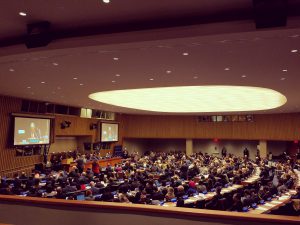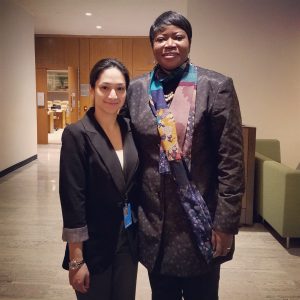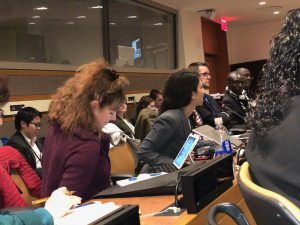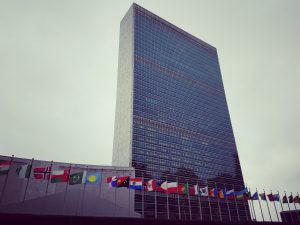By: Fizza Batool

16th Session of the International Criminal Court Assembly of States Parties at the UN Headquarters, New York.
This year I had the privilege of attending the 16th Session of the International Criminal Court Assembly of States Parties (ICC-ASP) at the UN Headquarters in New York. This annual meeting took place from December 4-14, 2017 and covered a broad range of issues. The most prominent issues being the activation of the Court’s jurisdiction over the crime of aggression, election of six new judges to the Court, budget and State cooperation concerns, and plans for commemorating the 20th anniversary of the Rome Statute. The Assembly was well attended by States Parties to the Rome Statute, Observer States, and numerous NGOs.
Since the Kampala Conference in 2010, States Parties have been ensued in an ongoing debate as to whether or not they should promulgate the Kampala Amendments, thereby giving the Court jurisdiction over the crime of aggression. The Kampala negotiations were difficult, and in order to achieve consensus, delegates agreed on the conditions that the amendments would come into force after January 1, 2017 and after receiving 30 ratifications by Member States.

Side Event hosted by the Permanent Mission of the Principality of Liechtenstein featuring Professor Leila Sadat, H.E. Mr. Christian Wenaweser, H.E. Mr. Adonia Ayebare, Ms. Paivi Kaukoranta, and Professor Roger Clark.
Professor Leila Nadya Sadat moderated a side event during this ASP, hosted by the Permanent Mission of the Principality of Liechtenstein, entitled From Nuremberg to New York: The historic activation of the International Criminal Court’s jurisdiction over the crime of aggression in 2017. The panel discussed the importance of activating the Court’s jurisdiction over the crime of aggression as it will not only remedy the lack of individual criminal liability for aggressors, but it will also complete the Rome Statute as originally drafted. After seven years, States Parties officially activated the Court’s jurisdiction over the crime of aggression on December 15, 2017. However, the Court’s jurisdiction is applicable only to nationals of the ICC Member States that have ratified the amendments.
The election of six new judges to the ICC completed after nine rounds. They include: Judge Tomoko Akane (Japan); Judge Luz del Carmen Ibáñez Carranza (Peru); Judge Reine Adelaide Sophie Alapini-Gansou (Benin); Judge Solomy Balungi Bossa (Uganda); Judge Kimberly Prost (Canada); and Judge Rosario Salvatore Aitala (Italy). The diversity of the new judges, as well as the number of women elected is commendable, and the right step forward for attaining geographic and gender distribution within the ICC.

ICC Chief Prosecutor Fatou Bensouda (right) with Harris Institute Fellow Fizza Batool (left).
While the ICC continues to make progress in conducting its operations, the Court faces two notable concerns going forward which are the budget and State cooperation. The ICC is tasked with investigating and prosecuting the most serious international core crimes, and the principle of complementarity was stressed heavily throughout this ASP by the ICC Chief Prosecutor Fatou Bensouda, States Parties during the General Debate, and civil society members during side events. National judicial systems have precedence over investigating and prosecuting these heinous crimes, and the ICC being a Court of last resort, only steps in when States are either unwilling or unable to do so. The current budget of the ICC simply cannot accommodate investigations and prosecutions into every situation. Furthermore, these cases often involve hundreds of thousands of victims. During an event organized by the Coalition for the International Criminal Court (CICC) in which civil society members met with Prosecutor Fatou Bensouda, Deputy Prosecutor James Stewart, and Head of Cooperation Amady Ba, among other representatives from the Office of the Prosecutor (OTP), I inquired as to the optimal budget needed for the Office to conduct its investigations and prosecutions efficiently and effectively, and how NGOs can help. Prosecutor Stewart noted that NGOs have great capacity to help the Office attain adequate resources by engaging in open dialogue with governments. At the close of the ASP, States set the 2018 ICC budget for €147,4 million despite the Court requesting €151,4 million.

Professor Leila Sadat and Harris Institute Fellow Fizza Batool attending a CICC organized meeting with the Office of the Prosecutor.
Now more than ever, State cooperation with the ICC is imperative. There are currently 15 outstanding arrest warrants, including Omar Al-Bashir, President of the Republic of Sudan, for charges involving crimes against humanity, war crimes, and genocide. Despite his arrest warrants, Al-Bashir continues to travel freely to other States, most recently to the Hashemite Kingdom of Jordan, a State Party to the Rome Statute since 2002. On December 11, 2017, the ICC Pre-Trial Chamber II found that the government of Jordan failed to comply with an existing obligation to arrest Al-Bashir when he visited the country to attend the League of Arab States’ Summit in March 2017. The Chamber decided to refer the matter to the ASP and the UN Security Council. Additionally, this ASP stressed the need to increase the number of States Parties to the Rome Statute. During the General Debate, many States expressed their disappointment and regret over Burundi’s withdrawal from the Rome Statute and South Africa’s intent to commence withdrawal proceedings. States welcomed the government of The Gambia on the reversal of its decision to withdraw from the Rome Statute.

United Nations Headquarters, New York.
Next year will be exceptionally important for the ICC as it celebrates the 20th anniversary of the Rome Statute. William R. Pace, CICC Convenor, noted that 2018 will present an opportunity to re-energize commitment to the Rome Statute, the ICC, and international justice as a whole while building partnerships with members of civil society, governments, academics, the youth, and many others as we continue to fight against impunity, crimes against humanity, and genocide. The anniversary will be officially celebrated on July 17, 2018. President-Elect O-Gon Kwon (Republic of Korea) of the ASP, succeeding Mr. Sidiki Kaba (Senegal), promised in his opening address to ICC Member States to work toward greater State cooperation, achieving universality of the Rome Statute, and continuing to engage with civil society on these matters.
